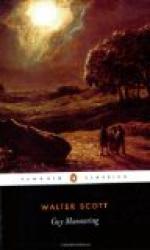The Laird himself was one of those second-rate sort of persons that are to be found frequently in rural situations. Fielding has described one class as feras consumere nati; but the love of field-sports indicates a certain activity of mind, which had forsaken Mr. Bertram, if ever he possessed it. A good-humoured listlessness of countenance formed the only remarkable expression of his features, although they were rather handsome than otherwise. In fact, his physiognomy indicated the inanity of character which pervaded his life. I will give the reader some insight into his state and conversation before he has finished a long lecture to Mannering upon the propriety and comfort of wrapping his stirrup-irons round with a wisp of straw when he had occasion to ride in a chill evening.
Godfrey Bertram of Ellangowan succeeded to a long pedigree and a short rent-roll, like many lairds of that period. His list of forefathers ascended so high that they were lost in the barbarous ages of Galwegian independence, so that his genealogical tree, besides the Christian and crusading names of Godfreys, and Gilberts, and Dennises, and Rolands without end, bore heathen fruit of yet darker ages—Arths, and Knarths, and Donagilds, and Hanlons. In truth, they had been formerly the stormy chiefs of a desert but extensive domain, and the heads of a numerous tribe called Mac-Dingawaie, though they afterwards adopted the Norman surname of Bertram. They had made war, raised rebellions, been defeated, beheaded, and hanged, as became a family of importance, for many centuries. But they had gradually lost ground in the world, and, from being themselves the heads of treason and traitorous conspiracies, the Bertrams, or Mac-Dingawaies, of Ellangowan had sunk into subordinate accomplices. Their most fatal exhibitions in this capacity took place in the seventeenth century, when the foul fiend possessed them with a spirit of contradiction, which uniformly involved them in controversy with the ruling powers. They reversed the conduct of the celebrated Vicar of Bray, and adhered as tenaciously to the weaker side as that worthy divine to the stronger. And truly, like him, they had their reward.
Allan Bertram of Ellangowan, who flourished tempore Caroli primi, was, says my authority, Sir Robert Douglas, in his Scottish Baronage (see the title ’Ellangowan’), ’a steady loyalist, and full of zeal for the cause of His Sacred Majesty, in which he united with the great Marquis of Montrose and other truly zealous and honourable patriots, and sustained great losses in that behalf. He had the honour of knighthood conferred upon him by His Most Sacred Majesty, and was sequestrated as a malignant by the parliament, 1642, and afterwards as a resolutioner in the year 1648.’ These two cross-grained epithets of malignant and resolutioner cost poor Sir Allan one half of the family estate. His son Dennis Bertram married a daughter of an eminent fanatic who had a seat in the council of state, and saved by that




